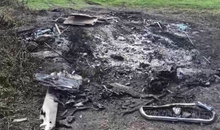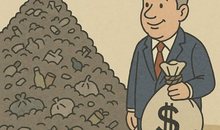
 Flash News
Flash News
Fight in Durrës cemetery, father and son injured
A woman dies in an accident in Tapiza, the 33-year-old driver is in custody
Last night she escaped the assassination attempt/ Who is Katerina Beqo, the woman who was in the car with her little son when her husband was executed (Event)
Suspected of being used in the murder of Gjovalin Prendit, a vehicle is found burned in Fushë Gjormë
"Albania couldn't hold on", Lara Colturi chooses Italy for her career

The risks increase as temperatures rise and greenhouse gas emissions continue to rise. A new report shows ways to overcome the situation.
The ecological crisis and man-made climate change have long been a very serious problem for humanity. This is nothing new. However, humans burn more coal, oil and gas than ever before, produce more waste and consume more resources than the planet can sustain.
“Figuratively, we are looking into the abyss. We know how to turn back. Yet we keep going towards it,” said Shen Xiaoming, director of the United Nations University Institute for Environment and Human Security (UNU-EHS).
Why is this so, and what are the possible paths out of the abyss? A report published today by her institute, titled “Turning Over a New Leaf,” attempts to answer this question. This annual report analyzes how natural hazards and disasters are interconnected and influenced by humans, and what are possible strategies for addressing these problems.
Many crises, few fundamental changes
The good news: A better future is possible, researchers say. However, many of today's approaches are aimed primarily at combating symptoms, rather than the underlying causes, according to scientists at UNU-EHS, based in Bonn.
For example, polluted beaches or rivers can only be cleaned up with better recycling systems. Although recycling is a valuable way to solve the problem, the main problems lie elsewhere – in the system of packaging and mass production for single use. If the goal is a waste-free future, then it is necessary to change the system of a society that throws things away after a single use, the report says. This is where the authors of the report want to intervene.
Radical change theory
To uncover the deeper causes of global problems, researchers have developed the so-called “Theory of Deep Change.” It examines the social structures and patterns of thinking that have led to certain problems that persist today. The authors view society as a social construct.
Some ways of thinking have led to the creation of structures that have caused unforeseen consequences, such as climate change, water scarcity, overproduction and overexploitation of global resources.
"Our research has shown that these processes and structures are largely based on the assumption that humans can and should dominate nature," says Caitlin Eberle in an interview with DW who worked on this report.
Ky supozim bazë shfaqet, në forma të ndryshme, në ligje, letërsi, filma dhe kontekste fetare, thonë autorët. Dhe kjo nga ana tjetër ndikon në qëllimet dhe strukturat e shoqërisë.
Rezultati: monokulturat, rregullimi i rrjedhës së lumenjve, zbutja e kafshëve dhe ruajtja e bimëve, si dhe përdorimi i pesticideve dhe herbicideve – të gjitha konsiderohen mjete legjitime për të arritur qëllimet sociale.
Supozimi ose modeli i mendimit “njeriu sundon natyrën” mbart kështu rreziqe dhe përfaqëson një pengesë për ndryshime të mundshme, pohojnë autorët.
“Ndryshimi i kësaj mendësie do të thotë të pranojmë se njerëzit janë pjesë e natyrës, vetëm një specie në një ekosistem të gjerë. Dhe kjo do të thotë që ne duhet të përpiqemi t’i përshtatim më mirë sistemet tona me nevojat e natyrës”, thotë Eberle.
Gjithashtu, supozimet e përhapura se rritja e pafundme ekonomike sjell me të vërtetë prosperitet, ose se planeti ka kapacitet të pakufizuar për të thithur ndotjen dhe për të siguruar burime, paraqesin pengesa për ndryshim. Kjo mënyrë e të menduarit, nga pikëpamja shkencore, është thjesht e gabuar, thotë Eberle.
Transformimi i domosdoshëm
Për një ndryshim vërtet të qëndrueshëm dhe të thellë, nevojiten ndryshime të brendshme dhe të jashtme. Nga njëra anë, kjo nënkupton besimet dhe vlerat personale të njerëzve – domethënë levat e brendshme. Dhe leva të jashtme mund të jenë ligjet e përshtatshme, rregullimet e sistemeve tatimore dhe subvencionet që mbështesin ndryshimet.
Edhe pse ndryshimi i vlerave dhe besimeve të ngulitura thellë është i vështirë, nuk është i pamundur. Historia e tregon këtë, thonë studiuesit. Për shembull, pirja e duhanit ishte e pranuar nga shoqëria deri disa dekada më parë dhe në shumë kultura shoqërohej me status më të lartë shoqëror dhe madje konsiderohej i shëndetshëm. Sot, të gjithë e dinë se pirja e duhanit është e dëmshme dhe është e ndaluar pothuajse në të gjitha ambientet e brendshme.
Ky ndryshimndodhi si në nivel individual ashtu edhe në atë shoqëror. Në mesin e shekullit të 20-të, shkencëtarët filluan të zbulojnë rreziqe serioze për shëndetin dhe përmes fushatave publike, ndalimeve dhe ndryshimeve në rregulla, qëndrimi i shoqërisë ndaj pirjes së duhanit ndryshoi.
Ndryshimi tashmë ka filluar
Për të kapërcyer rreziqet e sotme mjedisore, studiuesit besojnë se nevojitet një ndryshim në ndërgjegjësimin në pesë fusha: të trajtohen mbetjet si lëndë e parë, të heqësh dorë nga ideja se njeriu është i ndarë nga natyra, të kuptojmë se njerëzimi ndan një përgjegjësi të përbashkët, të zëvendësojë planifikimin afatshkurtër me atë afatgjatë dhe të rishqyrtojë atë që është me të vërtetë e vlefshme – pasuria ekonomike apo shëndeti i planetit.
According to Caitlin Eberle, it is not technical or logistical challenges that prevent people from achieving these goals, but mindset: “What is needed are truly radical changes in the mindsets that shape our culture and philosophy. We also need to believe that such changes are possible and that we can achieve them.”
This process of change cannot happen without resistance, the researchers admit. Conflicts of interest, fear and structural inertia are normal. But there is hope, the study says. It is precisely these conflicts that show that society has already begun to change./DW
Latest news


Fevziu: Veliaj's arrest gave the left a 'friend' on the eve of the campaign
2025-04-18 22:42:43


Swearing-in of MPs in Kosovo uncertain even on Saturday
2025-04-18 21:56:16
Find out what are the most aggressive zodiac signs who can't hold their nerve?
2025-04-18 21:32:47
Berisha: Rakip Veliaj has set up the same scheme as 5D
2025-04-18 21:12:04

Iranian Foreign Minister seeks Russia's support in nuclear talks
2025-04-18 20:42:52







The speech that aims for the European passport, but not for drinking water
2025-04-18 18:58:15
33-year-old Albanian dies in Greek detention
2025-04-18 18:33:45

Zelensky accuses US envoy Witkoff of spreading Russian narratives
2025-04-18 18:08:33



Fight in Durrës cemetery, father and son injured
2025-04-18 16:58:31
Israeli strikes kill at least 17 people in Gaza
2025-04-18 16:29:04
A woman dies in an accident in Tapiza, the 33-year-old driver is in custody
2025-04-18 16:26:04


EU: It is essential for Kosovo to quickly form a new government
2025-04-18 15:53:40
Two Albanians sentenced to 18 years in prison for raping English woman
2025-04-18 15:44:34

How to prepare your skin for a perfect tan this summer?
2025-04-18 15:16:02
Dritan Rexhepi refuses to testify about the kidnapping of Jan Prenga
2025-04-18 14:59:18

Abuse of "SASPAC" funds/ GJKKO postpones hearing against Ilir Beqaj
2025-04-18 14:38:26
Meloni in Washington, Trump: We will have an agreement with the EU
2025-04-18 14:22:16





Piranha Investigation/We consumed milk with aflatoxin
2025-04-18 13:06:16
Letter to first-time voters!
2025-04-18 12:56:06


Berisha: A judge ordered SKAP to investigate Rama for the villa in Surrel
2025-04-18 12:20:51





BKH agents attacked, Fier court leaves Agron Kapllanaj's grandchildren in prison
2025-04-18 11:22:14
"Albania couldn't hold on", Lara Colturi chooses Italy for her career
2025-04-18 11:10:50
Rubio: We will withdraw from Russia-Ukraine peace deal if there is no progress
2025-04-18 10:58:18


Beyond the horizon, life goes on! Black Friday and Easter
2025-04-18 10:31:31

VIDEO/ Diaspora vote, Albanian shows the middle finger to the SP
2025-04-18 10:10:47
Ajola Xoxa appears before SPAK, implements the "compulsory appearance" measure
2025-04-18 09:58:34





Foreign exchange, April 18, 2025
2025-04-18 08:58:05
Germany needs construction workers
2025-04-18 08:55:05


Horoscope, what do the stars have in store for you today?
2025-04-18 08:23:30
Temperatures reach up to 24 degrees, weather forecast
2025-04-18 08:08:21
Posta e mëngjesit/ Me 2 rreshta: Çfarë pati rëndësi dje në Shqipëri
2025-04-18 07:52:20

Assassination in Tirana, police react: 4 injured in Trauma, two of them minors
2025-04-17 22:34:30
Gunfire in Tirana, 4 people injured
2025-04-17 22:16:15

Tirana Incinerator, Lala: Officials were punished as if they stole a chicken
2025-04-17 21:50:29
Wealth Zodiac: Who has the money magnet?
2025-04-17 21:47:18





Assassinations in Lezha Plain, Roan Brahimi's father is killed
2025-04-17 20:29:59

The first 600 ballots from the diaspora arrive in Albania
2025-04-17 19:52:59

Farmers who make BÉ-eee and farmers of the EU!
2025-04-17 19:30:47

Tobacco: 0% tax for freelancers, PD with a clear plan for the middle class
2025-04-17 19:07:05

Car hits 9-year-old child in Pogradec
2025-04-17 18:42:15
Alizoti accuses SPAK: It has failed in supervising the elections
2025-04-17 18:31:42
Mental health alert: Work without limits, mind under pressure
2025-04-17 18:09:04
Two vehicles collide, 29-year-old dies in Tirana
2025-04-17 18:01:45
Rama from Dibra: Half of Albanian men are syrians, the rest vote for the DP!
2025-04-17 17:55:58
Top Ukrainian, European and American leaders meet in Paris
2025-04-17 17:45:35

"Metamorphosis", the Court takes time on the way to judge the defendants
2025-04-17 17:24:50
